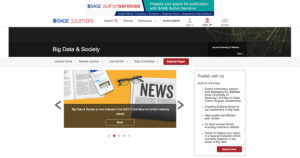Theme: Big Data
Back to Top
|
 |
|
TeachEngineering: Big Data, What Are You Saying?
|
Science |
|
Big data is the massive accumulation of digital information collected by governments, corporations, and other institutions. Although "we analyze and utilize less than one-half a percent of the data that exists," big data is a quickly growing field with implications spanning from healthcare and policy decision-making to entertainment. High school educators looking to introduce students to this exciting field should check out this hands-on activity from TeachEngineering, which covers the basics of data collection and analysis. Students work in pairs and begin by finding and importing data into Excel, where they then clean and chart these data. Next, each pair calculates relevant statistics and "summarize[s] their work by suggesting product launch strategies and reporting their findings and conclusions in class presentations." Geared toward students in grades 9-12, this lesson plan includes PDF and Word document versions of a data finding tip sheet, a worksheet to help students work with data in Excel, presentation rubrics, and an Excel example (using ESPN data). At the above link, readers will also find an overview of assignment procedures, big data vocabulary definitions, guidance on assessment, troubleshooting tips, and more. [EL] |
|





|
|
 |
|
All Hail the Algorithm
|
Science |
|
Big data and algorithms are everywhere, but how much do they really affect everyday life, and in what ways? These are the main questions under discussion in All Hail the Algorithm, a five-part video series published by Al Jazeera in July 2019. Presented and produced by multimedia journalist Ali Rae, this series examines and critiques the effects of algorithms and the tech companies who create them. Each episode is between 15 and 20 minutes in length and focuses on a particular aspect of algorithmic influence, with the first episode concentrating on algorithms' trustworthiness. Subsequent episodes explore the power of Big Tech in developing countries, the role that algorithms play in online manipulation, privacy concerns around biometric technology, and how design influences users' compliance with data harvesting and how long they spend online providing data. As part of these explorations, Rae speaks with numerous experts around the world, such as Nanjira Sambuli, a researcher and digital rights advocate based in Kenya, and Samantha Bradshaw, a doctoral candidate at the Oxford Internet Institute in the UK. Those interested can watch the entire All Hail the Algorithm series at the link above. [JDC] |
|





|
|
 |
|
Women in Data Science Podcast
|
Science |
|
Readers who are considering pursuing a career related to Big Data and the generally curious, may want to check out the Women in Data Science Podcast. Launched in 2018, this well-produced and approachable podcast is part of Stanford University's Women in Data Science initiative. Episodes feature the host Margot Gerritsen, a Stanford professor of energy resources engineering and the former director of the Institute for Computational Mathematics & Engineering, interviewing "leading women in data science [who] share their work, advice, and lessons learned along the way." While these women all work in data science, their work represents a wide variety of disciplines and perspectives. For example, Marzyeh Ghassemi from the University of Toronto uses machine learning to improve healthcare and reduce algorithmic biases in that field, while Stanford PhD student Sherrie Wang uses data science to research ways to address global food security issues. As of this write-up, there are 16 episodes, each about 30 minutes long. At the link above readers can click the episode's title to view its notes and listen online, and those interested can also subscribe via Stitcher, Google Podcasts, or other podcast platforms. [JDC] |
|





|
|
 |
|
Big Data & Society
|
Science |
|
Big Data & Society is an interdisciplinary open-access journal that publishes scholarly work "in the social sciences, humanities and computing and their intersections with the arts and natural sciences about the implications of Big Data for societies." First published in 2014, this peer-reviewed, digital-only journal includes original research, as well as commentaries, editorials, and multimedia demonstrations. Recent topics include a collection of articles discussing how algorithms influence and are informed by our societal expectations and an article contemplating ethics regarding the Internet of Things. Readers interested in being notified of future articles can sign up to receive email alerts, and an RSS feed is also available. In addition to their academic publications, Big Data & Society also has a blog linked in their Journal Description (accessible via the drop-down Journal Info menu). This blog features essays that general audiences may find more approachable. Big Data & Society is led by a diverse editorial team composed of multiple international scholars, including Evelyn Ruppert of Goldsmiths, University of London, and Matthew Zook of the University of Kentucky. [JDC] |
|





|
|
 |
|
Code.org: CS Principles Unit 4 - Big Data and Privacy
|
Science |
|
What opportunities do large data sets provide for solving problems and creating knowledge? How is cybersecurity impacting the ever-increasing number of Internet users? How does cryptography work? This unit, developed by computer science non-profit Code.org, tackles these questions. The curriculum is aligned to AP Curriculum Framework standards and the AP CS Principles assessment. Users can navigate through the unit's nine chapters using the circular numbers at the top of the page, or by selecting the links in the blue rectangles on the upper right. These chapters delve into topics such as Simple Encryptions and Public Key Cryptography, each with a Teaching Guide (containing activities ranging from 20-40 minutes long on average), learning Objectives, associated Links, and Support links. Some sections also contain Vocabulary definitions. All lessons and handouts can be downloaded as PDFs via the menu at the top of the site. Also accessible from the Unit 4 landing page are Other Resources related to big data and privacy, such as activity guides, worksheets, and educational videos. [EL] |
|





|
|

















